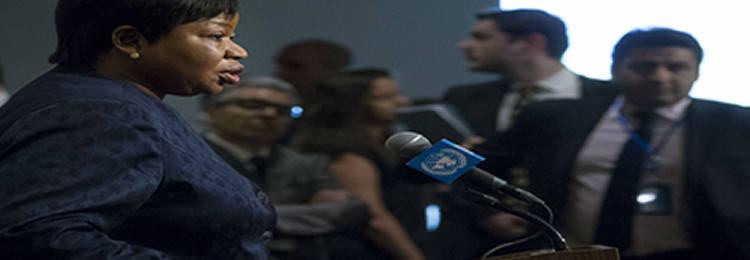With 300,000 dead and over 3 million in refugee camps, Darfur in western Sudan is not the kind of humanitarian crisis that should escape world attention – but it has.
Last week, Fatou Bensouda, the Chief Prosecutor at the International Criminal Court, presented her 23rd report on the situation in Darfur to the UN Security Council in New York.
Like every report the Office of the Prosecutor has presented for the past 10 years, it detailed the ravages of a decade-long war to which the world has turned a blind eye.
“A reasonable observer cannot be faulted for asking: How many more such findings must be rendered by the Court to spur this Council into action?” Bensouda posed.
A spirited campaign to have the Council intervene to bring to justice those responsible for the atrocities have produced no action. No armed response, no trade embargoes or referring the situation to the ICC. The council has made over 10 resolutions regarding the situation in Darfur including sending a peace mission, but that has not stopped the war crimes.
“Worrying grave crimes continue to be committed in Darfur since the situation was referred to the Security Council 11 years ago,” she said.
Five years ago, Bensouda suspended investigations into atrocities in Darfur citing the difficulties her office was facing in executing its mandate.
“A list of obstacles complicates our work: lack of access to the territory of Sudan; resource constraints and non-execution of the long outstanding arrest warrants have all contributed to the slow progress in investigations,” she said.
Bensouda faulted the Council for “its conspicuous silence over Sudan’s non-compliance with its own resolutions”.
The ICC has issued two arrest warrants against Sudanese President Omar Bashir for war crimes and crimes against humanity, but he is yet to be apprehended. On March 4, 2009 the ICC issued an arrest warrant against Bashir for seven counts of crimes against humanity and war crimes. On July 12, 2010 the ICC issued an additional warrant on three counts of genocide for ethnic cleansing in Darfur. He is the only sitting head of state who is wanted by the Court.
In her speech to the Council, Bensouda accused States Parties to the Rome Statute of failing to arrest Bashir and allowing him to visit with them freely.
“Sadly, my Office’s countless appeals to you for action to address the persistent failure of Sudan to comply with its international obligations have not been heeded,” she said.
She said the inaction by the council had emboldened Bashir to continue travelling across international borders despite the issuance of two arrest warrants against him by the Court.
Since the warrants were issued, Bashir has made over 20 trips in African countries that are signatories to the Rome Statute.
Bensouda said States Parties have made a mockery of the Court because of the council’s failure to act in response to findings of non-compliance issued by ICC judges. Consequently, States Parties and certain non-parties not only to facilitate Bashir’s travels to their territories, but also invite and host him.
Uganda is the latest country to have had Bashir as its guest during the swearing in of President Yoweri Museveni for his seventh term.
Set up in 1946 after the World War II, the UN Security Council comprises 15 members, five of them — Britian, France, China, the United States and Russia — are permanent, while 10 serve for two years on a rotational basis.
The council is the UN’s most powerful body with power to make binding decisions about war and peace.
“What message are we sending to would-be perpetrators if those against whom international warrants have been issued for the world’s most egregious crimes can travel freely, and without any repercussions for those who facilitate, or worse, keep suspects of atrocity crimes as company?” Bensouda asked.
Besides cooperation, the Chief Prosecutor also wants the council to take decisive action on countries that continue to fail in their obligations to arrest Bashir.
She said that victims of crimes have almost given up on their quest for justice. Already, eight victims who had agreed to testify against Bashir have withdrawn and have said they are no longer interested in the case.
“Despite these challenges, my Office is continuing its investigations with a view to deliver justice to the victims of grave crimes under the Rome Statute in Darfur,” she said.







